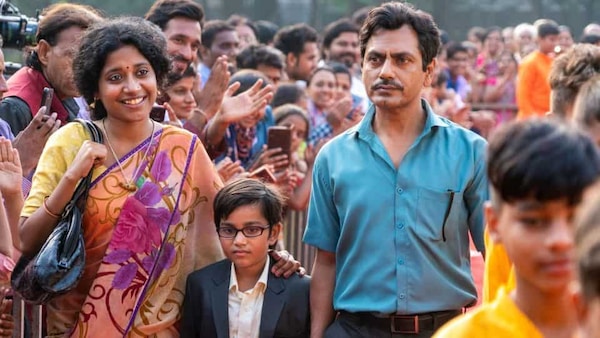'Serious Men' review: Lying for a better life

-(from left) Indira Tiwari, Aakshath Das and Nawazuddin Siddiqui in 'Serious Men'
- Uday Bhatia
LiveMint
Last Updated: 12.38 AM, Sep 30, 2020
Who among us hasn’t committed to memory a piece of trivia, a line of verse? This may not be done purposefully, but the unveiling is almost always to our advantage, to impress an object of affection or someone whose approval we seek. Now imagine if a similar sort of acquisition—a few lines, a few numbers—could have life-altering consequences. How far would you go?
This is the question at the heart of Serious Men, a film by Sudhir Mishra based on Manu Joseph’s 2010 novel of the same name. Ayyan Mani (Nawazuddin Siddiqui) is a Dalit man working as a personal assistant at a scientific research institute. He lives with his wife, Oja (Indira Tiwari), and son, Adi (Aakshath Das), in a one-room in a Mumbai chawl. He’s desperate to escape the sort of life people like him are supposed to lead, one of waiting on upper-caste ‘serious men’ and waiting to use the common loo in the building every morning. And so he pins his hopes on Adi as a way out.
The conventional underdog story would be if Adi turned out extraordinarily gifted and lifted his family out of poverty years later. But he’s a regular school-going kid and Ayyan, recognizing this, takes a more creative route. He starts feeding Adi things to say, about photosynthesis and galactic microbes, that cause a stir at school. Soon, Adi is being touted as a genius, stunning public gatherings with scientific gibberish relayed through by his father. A concrete opportunity presents itself in the form of Dalit leader Keshav Dhavre (Sanjay Narvekar) and his daughter, Anuja (Shweta Basu Prasad), who want to ‘redevelop’ Mani’s chawl, and recognize Adi’s potential as a mascot for their schemes.
In a scene that points to Ayyan's farsightedness, he explains to his wife, as they sit by the pool in a fancy hotel he’s conned his way into, how he is ‘2G’, second-generation, the son of a backward caste man who never got an education. "Though I went to school," he tells her, "I realized the importance of education only later." Their son will go to the best schools and become successful. And his son—4G—will have everything. "It takes four generations," he concludes, "to be able to do nothing at all."
Dhavre and his daughter—wealthy, powerful—are a model of what his life could be. You can tell the rough-spoken Dhavre has come up the hard way but Anuja is savvy, English-speaking, corporate-smooth, the 3G that Ayyan hopes Adi will become. There’s a scene where she tells her lawyer she doesn’t want to play the “Dalit woman victim shit card”. Neither does Ayyan; he plays everyone around him but doesn’t want to feel indebted. When Adi’s school principal tries to get them to convert to Christianity with the promise of a scholarship, he manages to circumvent her pressure while retaining the perks.
Manu Joseph’s novel is a sly and scabrous work, almost gleeful in its portrayal of Mumbai as a dirty, teeming, unequal, ambitious metropolis. Mishra and his co-writers, Abhijeet Khuman and Bhavesh Mandalia, greatly condense the book’s weakest link—a long B-plot involving institute director Arvind Acharya and his affair with a colleague—and keep the focus on Ayyan and Adi. There is, however, a softening of tone. Mishra said in an interview to Lounge that his is a 'gentler mind' than the one that wrote the book, and though the film is often acerbic, this does ring true. The book resolves its problems with unsentimental maneuvering on Ayyan’s part; the same issues are tackled on a more emotional level in the film.
Late in the film, we see a photograph of a mother and child displayed in a gallery. It’s revealed that the subjects are Ayyan and his mother, who died when he was young; Ayyan’s father had forced her to lose weight for the shoot when the photographer remarked that she looked too healthy for a farmer. We’re meant to realize that, in pushing Adi, Ayyan is becoming his father—the film spells it out in case we miss it. It’s a decent scene but I can’t help feeling it would have been more in character for Ayyan to be making up the story, playing on upper-caste guilt in order to get his work done.
In Ayyan, Siddiqui gets to play something of a mean between two of his great Mumbai characters, the gentle chawl-dweller with a dream from Bombay Talkies and the serial killer from Raman Raghav 2.0, always a step ahead of everyone else. Ayyan isn’t violent like Raman but he can be ruthless; the scene on the roof where he threatens his son’s friend has a desperation that’s perfect for Siddiqui, who can turn emotions on a dime.
Mishra, who’s made great Mumbai films in Dharavi and Iss Raat Ki Subah Nahin, manages the tricky feat of dealing with caste politics without lapsing into liberal pieties (there's a hilarious scene where Ayyan describes himself as shudra and a clerk nervously tries to quiet him). But Serious Men is let down by its competent but conventional visual schema—everything seems too clean and ordered. The film seems ready to go out that way too, with a heartfelt speech and the family unit reunited. Which is why it’s a relief that the final image is of Ayyan, far from Mumbai, all out of grand schemes, father to a perfectly average, happy boy. The look on his face is of someone condemned to live the rest of his life like a schnook.

 Premium
Premium